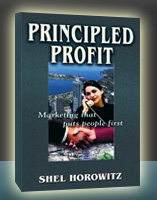Scammers and the End of the World: A Marketing Ethics Issue
|
Guest article by John Forde, originally published in his newsletter under the title, “The End of the World, Guaranteed:Lessons From a Professional Pessimist”
“Don’t worry about the world coming to – Charles Schulz
Here, he’d blown over $140,000 of his retirement cash… and on what? On ads announcing the end of the world. This was back in 2011, during a mini-mania for apocalyptic forecasts. He was so sure it would happen. He staked pretty much everything on it. And yet it didn’t come. “I’m not sure what happened…” he said, as he stood staring at his watch at 6:01 pm in times Square. Zero hour had come and gone. The press, of course, had a field day with Bob — and others who were just as convinced — and the rapture that wasn’t. “I’m getting mocked and picked on,” said another guy, who spent a fortune turning his car into a mobile billboard so he could spread news of the apocalypse. “At least I got to see the country,” said a third rapture-seeker, who had packed his family into a car to drive 3,000 miles to a more scenic end-of-times picnic spot. Marketers jumped on the opportunity too. For just $135, claimed one post-Rapture pet service, they’ll take care of Fido while you’re off enjoying cataclysm. There pitch? “After the Rapture,” they asked, “Who will walk your dog? PayPal accepted…” Another company sold “tactical sandwiches” for six bucks each. Per the ads, your end-times lunch kit will have a shelf life of two years. After all, when the world ends… who wants to get caught with a case of the hungries, am I right? In Florida, another company promised to send pre-written letters — in fancy calligraphy, and for the low, low price of $800 — to any loved ones who didn’t get picked for redemption. I can imagine it now… “Dear Jerkface, I told you that you’d be sorry. And now look who’s stuck eating brimstone for all eternity…” Yet another company offered to sell helpful guidebooks for the “Left Behind.” Way to seize an opportunity! There was even an app — a “Rapture Detector” — that promised to remind you the end was nigh, 30 minutes before it took place. Just in case… you know… you forgot. Even the amateurs got in on the end-of-the-world market, flooding Craigslist with offers to buy up cars, houses at as long as they were offered at “fire-sale” prices. One ad suggested rapture-seekers could donate any left-behind cash, for “food, water and other necessities such as tanning, cigarettes, gray goose vodka, rent & car payment money etc…” to the unbelievers. And who was at the root of all this? You might have guessed, it was a particularly pessimistic… possibly talented… copywriter. THE END OF THE WORLD, GUARANTEED The man in question is… was… Harold Camping, an 89-year-old guy who spent millions on “Judgment Day” ads. He put it on 150 radio stations (including his own) and managed to make his message go viral on the Internet. Thousands bought in. Why? My guess is, people crave certainty. Even when it’s promising the end of everything. And maybe that’s the first lesson to glean… Eliminating doubt that a perceived problem exists can be as powerful as offering a reliable solution. And apparently, Harold was very good at doing exactly that. He even offered — and this is something my co-presenters and I will be talking about this week at Bootcamp — a powerful guarantee to seal the deal. It literally said, on Harold’s website, “Judgment Day… the Bible guarantees it!” Now, Harold DID turn out to be dead wrong. Lucky for the rest of us. And yet, he managed to talk lots of people into blowing their lifetime savings. Many quit their jobs. One even tried to kill herself and her family, rather than face it. History, of course, is littered with crackpots who know how to persuade. Many of them get found out, with unsurprising consequences. For instance, the day after the world didn’t end, Camping and his wife hid in a motel from reporters. About his confused followers, he said only, “They’ll cope.” But again, why tell you all this? Because it made me think about guarantees, why we make ’em, what they need to do, and why you have to keep them. Specifically, these three tips… 1) Make your guarantees honest. Harold’s offer aside, a guarantee you don’t honor is the last guarantee you’ll ever need to make. Because the bad karma it generates has a longer shelf life than radioactive coffee in the break room at Fukushima. When in doubt, honor the terms. Even if you think the customer is trying to take advantage. You’ll be happier you did. 2) Make your guarantees simple. Dreaming up multi-layered guarantees can be fun, adding this angle and that. Believe me, I’ve done it too often myself. But a simple, clear-cut guarantee is better. Pick the single strongest promise you’ve already made, and center the guarantee around that. Which brings us to… 3) Make your guarantees connect. That is, try to use the same language in the guarantee that you made in the promise up front. Literally, repeat the promise and offer to put your money where your mouth is. The more specific you can be, the better. For instance, let’s say you’re promising endless post-rapture bliss after the end of days. Your guarantee might read… “If at any time during eternity, you get bored with Paradise or feel you’re not fully redeemed — as I promised — just say the word. I’ll cut you a refund check or credit your order back to your credit card. No questions asked.” Doesn’t that sound like a pretty good deal? Copyright 2016 by John Forde BY THE WAY, if you ever want to share one of these CR articles in a blog, in an email, in a book, on a milk carton… or on one of those banners they hang on the back of airplanes at the beach… GO AHEAD! You’ve got my blessing. Just promise you’ll include a link back to my website. And don’t forget to encourage your readers to sign up for the $78 worth of free gifts we give away to new subscribers! |


 Shel specializes in affordable, ethical, and effective marketing for authors, publishers, small businesses, nonprofits, and community groups. Copywriter, marketing and publishing consultant, international speaker, and award-winning author of seven books.
Shel specializes in affordable, ethical, and effective marketing for authors, publishers, small businesses, nonprofits, and community groups. Copywriter, marketing and publishing consultant, international speaker, and award-winning author of seven books.